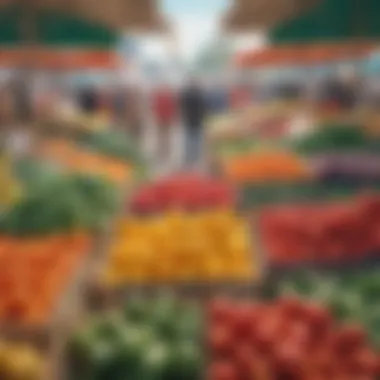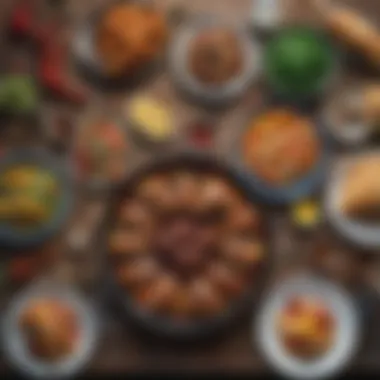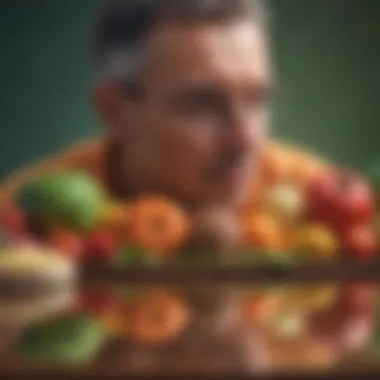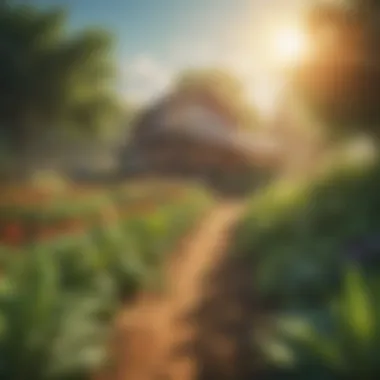The Connection Between Food and Culture in Pollan's Work


Intro
In the modern world, food serves more than just as sustenance; it connects to our memories, traditions, and cultural identities. Michael Pollan, a voice of reason in the cluttered discussions about food, encourages readers to think critically about what they eat and why. This article takes a deep dive into Pollan's work and the intricate relationship between food and culture.
Pollan's narratives engage the reader, intertwining personal stories with broader themes of ethics, sustainability, and tradition. Each meal becomes a reflection of cultural values, where every ingredient tells its own story and each preparation method underscores a deep-rooted history.
By exploring various aspects of Pollan's philosophy, such as how contemporary food practices often clash with traditional methods, we can gain insights into our own eating habits and make more informed choices. There’s an undeniable relationship between our forks and our culture, and Pollan’s insights unravel this connection in a way that's both enlightening and motivating.
Categories of Food and Culture
Ethical Eating and Responsibility
Pollan prompts us to reflect on the ethical implications of our food choices. As culture evolves, so does our understanding of what it means to consume responsibly. He highlights that the origins of our food matter—understanding where it comes from can significantly alter how we perceive its value. This awareness is pivotal in creating a sense of accountability towards our environment and communities.
Sustainability and Environmental Stewardship
The notion of sustainability is not just a buzzword; it encompasses the very essence of how we interact with nature. Pollan argues that sustainable practices are imperative for the future of our food systems. This entails respecting seasonality, supporting local farmers, and reducing reliance on mass-produced, heavily processed foods. Such actions can have a ripple effect, influencing broader movements aimed at enhancing ecological balance.
Return to Traditional Practices
Rediscovering traditional food practices has become a vital movement. Pollan emphasizes the beauty of simplicity, encouraging a return to home-cooked meals prepared with fresh, wholesome ingredients. This revival not only nurtures our bodies but also strengthens communal bonds, as families gather around the table to share their culinary heritage.
"The act of cooking is not just a chore; it is a form of cultural expression."
Book Summaries and Insights
Key Takeaways from Pollan's Work
In summarizing Pollan's lessons, a few key points stand out:
- Know Your Food: Understanding the journey of your food can reshape your relationship with it.
- Eat Food, Not Much, Mostly Plants: A simple philosophy that guides healthy eating habits.
- Support Local: Encouraging local food systems can foster not just better quality produce but also enrich your local culture.
How to Apply Insights in Daily Life
Applying Pollan’s insights doesn’t require a complete lifestyle overhaul. Instead, small, incremental changes can lead to profound impacts. Here are a few simple applications:
- Plan Meals: Spend time each week to plan wholesome, seasonal meals.
- Visit Farmers' Markets: Explore local offerings and converse with growers about their practices.
- ** Cook Together**: Unite family and friends in preparing meals, bridging gaps and creating shared experiences.
By applying these insights, individuals are not just making changes in their diets but also becoming part of a larger cultural shift towards a more mindful and sustainable way of living.
The Influence of Michael Pollan on Modern Food Discourse
Michael Pollan stands as a towering figure in contemporary discussions around food and culture. His works spark essential conversations regarding how we, as a society, engage with what we eat, and the broader implications of our dietary choices. Exploring Pollan's influence uncovers the intersections of ethics, sustainability, and tradition in food practices, making it a vital area of focus. By connecting food with cultural identity, his insights promote a deeper understanding of the implications surrounding the act of eating, beyond mere sustenance.
Biographical Context and Early Works
Pollan's journey isn’t just about food; it intertwines with a lasting inquiry into how our culture shapes our perceptions of it. Originally a journalist, Pollan began his career investigating the relationship between food and environment. His early articles in places like The New York Times were pivotal, laying the groundwork for more extensive writings that would follow. The mix of personal experience with extensive research became a hallmark of Pollan's writing, allowing readers to feel the weight of critical questions about food systems and values. This biographical context is essential for understanding his later works; it adds depth to the discussions on food production and culture he would later helm.
Major Publications and Their Impact
Pollan's contributions to food discourse appear prominently in his major publications. Each book sheds light on different facets of the food landscape, guiding readers towards more thoughtful engagement with their choices.
Cooked: A Natural History of Transformation
In "Cooked: A Natural History of Transformation," Pollan presents cooking as a profound transformation. It's an exploration connecting not only ingredients but also cultural and historical narratives tied to each dish we create. This work stands out due to its integration of science, tradition, and personal experience, making it not just a culinary guide but an enlightening journey through the history of food itself. Notably, Pollan argues that cooking is fundamental to fostering connections that help develop community and culture.
Food Rules: An Eater's Manual
"Food Rules: An Eater's Manual" offers a minimalist, yet impactful approach to eating with intention. The key characteristic of this publication is its simplicity—short, memorable rules that challenge the overly complex food advice prevalent today. This book encourages readers to adopt a more mindful approach to their diets, promoting benefits such as improved health and awareness of food sources. Its straightforward advice, like "Eat food, not much, mostly plants," resonates widely, making it a popular choice for individuals seeking practical guidance.
The Omnivore's Dilemma
In "The Omnivore's Dilemma," Pollan tackles a pressing concern: the overwhelming options we face as consumers in today’s food environment. This work probes into the ethics of food choices, raising questions about sustainability, health, and moral responsibility. The main characteristic here is Pollan's detailed examination of food origins—whether they come from industrial systems, organic farms, or foraged sources. It encourages readers to be more discerning about their food sources and consider the broader social and ecological consequences of their dietary choices. This inquiry into how food arrives on our plates is particularly relevant, reinforcing the idea that we are, in fact, what we eat.
Pollan's powerful narrative gives life to complex issues, inviting readers to reflect on their own food stories and choices.
Through these texts, Pollan invites us to not only educate ourselves but also to embrace our roles as conscious eaters in a world increasingly dominated by mass food production.
Understanding the Omnivore's Dilemma
The phrase "The Omnivore's Dilemma" might sound a bit cryptic, but it gets right to the heart of a significant concern in the world of food today. This dilemma is essentially the challenge of choice that we face as eaters. Knowing what to eat can feel overwhelming, especially when faced with a plethora of options that range from organic to fast food. In this section, we delve into why understanding this topic is crucial not just for individual health, but also for larger cultural and ethical conversations.


Pollan illuminates the complexities of the modern eater’s experience, emphasizing that food choices are laden with meaning and consequence. When we consider the decisions we make at the grocery store, or even in a restaurant, we aren't merely fueling our bodies. Instead, we are participating in a system that has far-reaching implications encompassing environmental health, animal welfare, and even economic structures.
Exploration of Food Choices
Exploring food choices takes us deeper into aspects like personal preferences and societal influences. It’s about more than just flavor or convenience; it involves values, traditions, and even psychology. For instance, many people gravitate towards local farmers' markets, seeking fresher produce and a sense of community connection. Yet, in another twist of fate, many might opt for fast food due to time constraints or budget limitations.
- Health Impacts: Our choices directly link to our well-being. Some opt for whole grains, while others prefer highly processed snacks; both paths affect health outcomes in significant ways.
- Cultural Influences: Different cultures value different foods. Ethnic cuisine can become a symbol of identity and belonging, making choice a reflection of the tapestry of cultural heritage.
- Ethical Considerations: Transparency around food production weighs heavily on today's consumers. Many folks are concerned about the origins of their meals, opting for ethically sourced or fair trade products.
It’s this web of interconnected motivations that Pollan encourages readers to consider. Every meal represents a choice, a vote for the kind of food system we want.
The Role of Industrial Agriculture
In grappling with the omnivore's dilemma, one can't ignore the vast impact of industrial agriculture on our food systems. This type of agriculture emphasizes mass production, often at the expense of quality and sustainability. Pollan's critique of this model unveils the shortcomings that many consumers might overlook.
- Monoculture Practices: Industrial farms often rely on a single-crop system, which can lead to soil degradation and loss of biodiversity.
- Chemical Use: The widespread application of pesticides and fertilizers has raised ethical and health concerns, connecting back to the food choices we make.
- Animal Husbandry: The treatment of livestock in industrial settings often contradicts ethical standards that many consumers hold dear.
Pollan highlights how these practices not only affect individual health but also shape societal norms around food consumption. As consumers become more aware of these issues, their choices reflect a growing demand for food systems that emphasize sustainability and ethical considerations. This juxtaposition of desires and realities creates the backdrop for Pollan's discourse, urging us to rethink what is on our plates.
"Our food choices reflect who we are and the world we want to live in."
Ultimately, understanding the omnivore's dilemma isn't just an intellectual exercise; it’s an invitation to engage more thoughtfully with our food systems. By becoming more conscious consumers, we can influence change, pushing towards a society that values sustainability, nutrition, and ethical standards.
Cultural Significance of Food
Food is not just a means to fill our bellies; it’s a powerful agent of culture and identity. It stitches together the fabric of our societies, offering a glimpse into the values, traditions, and stories of various communities. In Michael Pollan's explorations, the essence of food transcends mere sustenance, linking individuals to their heritage and each other in profound ways. This section aims to unpack these connections, emphasizing the various facets that establish food as a cultural cornerstone.
Food as an Identity Marker
Food serves as a potent symbol of identity. Each dish carries with it history and significance, telling stories of family, tradition, and geography. Take, for instance, the cultural particularity of a dish like biryani. It’s not simply rice and meat but a celebratory dish in many South Asian households, representing familial bonds and cultural occasions.
When ethnic communities engage in food practices, they often find a connector to their ancestral origins. A Jewish family preparing latkes for Hanukkah or a Mexican household making tamales for Christmas illustrates how food can become a celebration of one’s roots. Beyond the specific ingredients or techniques, food becomes a language of belonging and identity.
"The food we eat shapes who we are and also reflects where we come from."
Cultural identity through food is not limited to ethnicity; it’s interwoven with socioeconomic factors as well. Culinary trends, such as the rise of farm-to-table dining, often elicit discussions about class and accessibility. People are drawn to these movements for a variety of reasons: ethical considerations, health preferences, or even aesthetics. Thus, food choices manifest not only personal taste but also larger social dynamics.
Rituals and Traditions Surrounding Food
Food rituals are practically universal, forming an essential part of cultural expression. From weddings to holidays, communal gatherings often revolve around food, forging connections amongst participants. These traditions carry significance—transforming meals into rituals that celebrate life's milestones.
For example, during Thanksgiving in the United States, turkey carving becomes an almost sacred rite. The act of sharing a meal is rooted in constructing and strengthening bonds within families and communities. Similarly, seder plates during Passover carry layers of religious meaning and communal remembrance, providing a feast rich with symbolism.
In many cultures, food preparation can be a time for storytelling. Grandparents may pass down their secret tot the next generation, infusing the cooking process with family lore. This transmission of knowledge through food rituals can foster a sense of belonging while also preserving cultural heritage.
Additionally, food rituals can serve as a form of resistance against globalization. In a world that sometimes seeks to homogenize culture, traditional food practices can stand firm as an assertion of identity. Individuals or communities might choose to uphold their unique culinary customs as an act of cultural pride.
Ethics and Food Production
When it comes to the relationship between food and culture, the ethical dimensions of food production occupies a vital space in the dialogue. Food is not just a means of sustenance; it's interwoven with our values, beliefs, and social structures. Thus, understanding the ethical considerations behind food production helps illuminate how our choices impact the environment, society, and our own health. The implications are far-reaching, affecting everything from local economies to personal health and global sustainability. Pollan’s work prompts readers to reflect on these interconnected issues, sparking a necessary conversation about what is right and wrong in our food systems.
Sustainable Practices in Agriculture
Sustainable practices in agriculture stand at the heart of ethical food production. This approach seeks to meet the needs of the present without compromising the ability of future generations to meet their own needs. Pollan emphasizes that sustainable agriculture is not merely a buzzword; it represents a return to methods that respect the environment and promote biodiversity.
- Examples of Sustainable Practices:
- Crop Rotation: Allows the soil to regain nutrients while managing pests naturally.
- Organic Farming: Avoids synthetic chemicals, promoting healthier ecosystems.
- Agroforestry: Combines agriculture and forestry to create beneficial biodiversity.
These methods provide multiple benefits, like enhancing soil health, boosting local economies, and reducing carbon footprints. Pollan's advocacy for these practices challenges modern industrial agriculture, which often prioritizes profit over ecological and ethical considerations.
Animal Welfare Considerations
A cornerstone of ethical food production is the treatment of animals within the agricultural system. Industrial agricultural practices have often come under fire for their neglect of animal welfare in favor of efficiency and profit. Pollan's works highlight the need for a thoughtful reconsideration of how we perceive and treat livestock.
- Key Aspects of Animal Welfare:
- Living Conditions: Animals should be raised in environments that allow natural behaviors.
- Nutrition: A proper diet is crucial so that the animals can thrive, free from harmful additives.
- Humane Treatment: Farmers must emphasize humane slaughter techniques and treatment throughout the animals' lives.
By addressing these issues, Pollan encourages consumers to become advocates for better practices in livestock farming. Increasing awareness about animal welfare can lead to a significant shift in the way food systems operate, ultimately challenging the status quo that often prioritizes efficiency over compassion.
"The ethics of food production are not just about the act of eating; they reflect our collective identity and values as a society."
In summary, the dialogue around ethics and food production draws attention to the importance of our choices. By considering sustainable practices and animal welfare, we not only contribute to a healthier planet but also engage in a more profound cultural conversation about what it means to eat responsibly.


The Power of Cooking
Cooking transcends the mere act of preparing food; it embodies a practice rich with cultural significance, personal expression, and communal bonding. Michael Pollan emphasizes this notion in his work, illustrating how cooking serves as a transformative process that redefines our relationship with food. Through the act of cooking, individuals engage in a dialogue with their ingredients, their traditions, and their communities. This section explores the depth of cooking’s influence, focusing on its transformative process and the contrast between traditional and modern techniques.
Cooked as a Transformative Process
The act of cooking is not merely functional; it is profoundly transformative, both physically and emotionally. Pollan notes that cooking allows us to manipulate ingredients into a nourishing medium, shaping them to fit our tastes and needs. This transformation highlights several key elements:
- Nutritional Benefits: Cooking not only enhances flavors but also increases the bioavailability of nutrients. When we cook vegetables, for instance, we often make them easier to digest and draw out their beneficial properties.
- Cultural Connection: Each recipe and cooking method carries the weight of history and tradition, creating a tapestry of cultural heritage. Through cooking, individuals can connect with their ancestry, passing down knowledge and customs over generations.
- Mindfulness and Creativity: Engaging in the cooking process cultivates mindfulness, allowing individuals to appreciate the textures, aromas, and colors of their food. This awareness fosters creativity, as each dish becomes an expression of the cook’s unique personality.
Pollan’s assertion that "cooking is an act of intimacy" rings true here; it’s about forging connections, not just with the food, but with ourselves and each other. This intimacy reveals how cooking stands as a vessel for emotional nourishment, much like the meals we share.
Traditional vs. Modern Cooking Techniques
In today's fast-paced world, the clash between traditional and modern cooking techniques has become increasingly apparent. Pollan emphasizes that understanding this tension is crucial to grasping the broader narrative of our food culture.
Traditionally, people relied on methods handed down through family lines, often using local ingredients and seasonal produce. Techniques such as fermentation or preservation reflect both resourcefulness and an intimate connection with one’s environment. These time-honored practices don't just sustain us; they build community bonds and foster respect for what the land yields.
Modern cooking, on the other hand, often gravitates towards convenience, leveraging technology and pre-packaged ingredients. While the benefits of efficiency and accessibility are undeniable, this shift can lead to a disconnection from the very essence of ingredients. Unlike traditional techniques, which nurture patience and respect, modern practices sometimes encourage a one-dimensional approach to food.
- Benefits of Traditional Techniques:
- Advantages of Modern Techniques:
- Foster deeper connections with food sources
- Encourage seasonal eating, supporting local farmers
- Embrace techniques that enhance flavor and nutrition
- Save time for busy lifestyles
- Offer innovative cooking experiences through technology
- Provide wider access to diverse foods
Ultimately, Pollan advocates for a balance between these two approaches. By embracing the skills and rituals of traditional cooking while being open to modern innovations, individuals can cultivate a richer culinary experience.
"Cooking is at once simple and complex. It’s a means of making our most intimate relationships visible."
Personal Responsibility in Food Choices
Understanding personal responsibility in food choices is a key part of Michael Pollan's philosophy. It's not just about what we eat but about how our choices resonate within our communities, health systems, and the environment. When individuals take ownership of their eating patterns, they contribute to a larger narrative of food sustainability and ethical eating.
By being conscious of our dietary options, we create a ripple effect. Choosing local produce, for instance, not only supports local farmers but also diminishes the carbon footprint associated with shipping foods from distant farms. This kind of decision can momentarily seem inconsequential but, when seen through a larger lens, it becomes clear that every decision counts.
Pollan emphasizes this point by inviting readers to reflect on their habits. He encourages them to ask, "What is the origin of this food?" or "What are the impacts of this choice?" This self-inquiry can lead to more thoughtful consumption that champions quality over quantity. Thus, taking personal responsibility often results in improved well-being, a stronger connection to the food system, and a deeper appreciation for the craft of cooking.
Mindful Eating Practices
In the rush of modern life, it’s easy to treat meals as mere fuel rather than experiences to be savored. Mindful eating, as Pollan advocates, reintroduces the ritual of consuming food. Engaging fully with what’s on one’s plate encourages a more profound appreciation for flavors, textures, and nutritional value.
- Pay Attention: This means really focusing on the meal, observing colors, scents, and the sensations of eating. Taking the time to enjoy each bite helps to foster a deeper connection with the food.
- Savor Each Bite: Recognizing that food is not only about sustenance but is also about enjoyment. In doing so, individuals often discover that they feel satisfied with smaller portions.
- Limit Distractions: By turning off screens and putting away phones during mealtime, one can create a more serene environment conducive to appreciating food fully.
Pollan's call for mindful eating underscores that each meal represents a choice, a moment where individual actions can contribute to broader cultural shifts.
Navigating Food Labels and Ingredients
As awareness grows around food choices, so does the complexity of understanding labels. Pollan stresses the importance of decoding the language of food packaging. Most labels can feel like a maze designed more for marketing rather than informing. Here’s how to navigate them:
- Ingredients List: Ingredients are usually listed in order of quantity. If the first few items are chemicals or long-unpronounceable names, it might be a red flag.
- Know Your Labels: Organic, non-GMO, and free-range are terms that sometimes are used loosely. Familiarizing oneself with these terms can aid in making informed decisions.
- Watch for Buzzwords: Words like "healthy" and "natural" can be misleading. They often lack regulatory definitions, impacting how the food is perceived.
Engaging with food labels allows individuals to reclaim power and make informed choices in their diets. Pollan believes that when people start to ask questions, they become advocates for a food system that prioritizes health and well-being.
"The act of eating is inextricably linked to the world we live in, and how we choose to interact with that world shapes our future." - Michael Pollan
By embracing personal responsibility, mindful eating, and informed navigation of food labels, individuals contribute to a culture that values sustainability and ethics in food consumption.
The Future of Food Systems
The conversation around food is evolving rapidly. As we stand at the crossroads of tradition and innovation, understanding the future of food systems is more crucial than ever. Michael Pollan brings to the forefront the pressing need to reevaluate how we produce, consume, and connect with food. This section delves into the significance of sustainable agriculture and the looming effects of climate change, which are key players in shaping our culinary landscape.
Innovations in Sustainable Agriculture
Sustainable agriculture isn't just a buzzword; it is a necessary approach for the future. Pollan emphasizes that finding new ways to cultivate our food while being kind to the planet can have profound benefits. Innovations in this field are not just about technology, but also about rethinking how we interact with nature.
- Regenerative farming: This method focuses on improving soil health. It includes practices that restore ecosystems—like crop rotation and agroforestry. These techniques can drastically enhance biodiversity and lead to healthier crops.
- Vertical farming: By growing food in controlled environments, often in urban settings, we're able to reduce land use and transportation footprints. This is particularly important as urbanization continues to rise.
- Permaculture: This philosophical approach integrates environmental stewardship with sustainable food production. It could be the solution for communities looking to foster resilience in local food systems.
Pollan's insights often highlight the interconnectedness of food, environment, and society, underlining that innovation should also support local economies and enhance community engagement.
The Impact of Climate Change on Food Production
Climate change poses a significant threat to food security worldwide. As Pollan notes, shifts in temperature and weather patterns can make farming increasingly unpredictable. The rising temperatures can lead to altered growing seasons, pest outbreaks, and significant crop losses, which ultimately affect food availability.
- Increased heat: Many crops, like wheat and corn, thrive within specific temperature ranges. As climate change alters these conditions, the yields may plummet, leading to higher prices and reduced access.
- Shifting rainfall patterns: With some areas experiencing excessive rain while others face drought, the ability to reliably produce food becomes precarious. Farmers may have to adapt quickly to these changes, seeking new drought-resistant or flood-tolerant crop varieties.
- Global supply chain vulnerabilities: As we become increasingly reliant on global food systems, localized climate effects can ripple worldwide. A drought in one region can lead to price hikes and shortages elsewhere.


Pollan's emphasis on local food systems offers a glimmer of hope amid these challenges. By encouraging communities to support local farmers and prioritize regional food sources, we can build resilient networks that are less susceptible to global perturbations.
"Food is a lens through which we can see the world. As we look to the future, it's critical to see it clearly, understand our role, and foster inclusion through our food systems."
By embracing innovations and preparing for the impacts of climate change, we can work towards a future that honors both the planet and our health. The dialogue that Pollan sparks reminds us that while the challenges are significant, the pathways that can lead to solutions are within our reach.
Pollan's Narrative Style and Its Influence
Michael Pollan's approach to narrative is not just a stylistic choice; it's a strategic method that shapes how we comprehend the complexities surrounding food and culture. In his works, Pollan crafts a storytelling landscape that invites readers to journey through ideas rather than just digest facts. His narrative style melds engaging prose with thorough research, creating a tapestry of information that is as enlightening as it is accessible.
Storytelling in Non-Fiction
The essence of Pollan's writing lies in his ability to transform non-fiction into a narrative that resonates on a personal level. Rather than merely presenting data, Pollan weaves tales that explore the history and cultural significance of food. He has a knack for painting vivid images with words, allowing readers to visualize the journey of their meal from farm to table. In The Omnivore's Dilemma, for example, Pollan adeptly navigates the intricacies of the food industry by recounting his own experiences and observations. This invites readers not just to read, but to feel the weight of each choice surrounding food.
- Engagement through Familiarity: By incorporating relatable anecdotes, Pollan breaks down complex concepts into digestible narratives. He shifts the focus from abstract ideas to real-life applications, leading readers to reconsider their own eating habits.
- Contextual Understanding: His storytelling approach gives context to the socio-political ramifications of food choices, presenting them as integral parts of everyday life rather than distant issues.
Through storytelling, Pollan builds a connection with his audience, encouraging a deeper engagement with the material.
Engagement Through Personal Anecdotes
Pollan's use of personal anecdotes is another hallmark of his narrative style. By sharing his own encounters with food systems, whether it’s an intimate visit to a sustainable farm or a trip to a bustling farmers market, he creates an emotional link between the reader and the subject. This technique not only informs but also personalizes the experience of learning about food.
For instance, when Pollan describes his adventures in sourcing ingredients for a meal, it’s not just about the food; it’s about the relationships he builds with those who produce it. He illustrates the painstaking process that goes into growing and harvesting food, emphasizing the human stories behind the production. This focus on personal connection highlights key points such as:
- Complexity of Choices: By detailing his own decision-making process, Pollan showcases the complexities involved in food choices, encouraging readers to reflect on their own.
- Cultural Reverberations: Through anecdotes, he shows how food ties into broader cultural narratives, influencing identity and community.
"Food, in its simplicity, carries the weight of history, culture, and politics. It is narratives like these that make us aware of the choices we make."
Culinary Movements and Social Change
Culinary movements play a pivotal role in shaping not only our dining habits but also the societal norms that surround food consumption. In this article, we explore how Michael Pollan has illuminated various aspects of these movements, intertwining them with broader social changes. What we eat does not merely satisfy our hunger; it reflects our values, our beliefs, and the communities in which we exist. Pollan’s insights invite us to examine how newer food ideologies are transforming our interactions with food and each other.
Food movements often arise in response to economic, environmental, and ethical considerations. They encourage consumers to rethink their choices, emphasizing local, sustainable, and socially responsible options. This transition feeds into a larger narrative of community solidarity, particularly in how local foods can positively impact community dynamics and health.
Local Foods and Community Impact
One of the more striking features of modern food movements is the push toward consuming local produce. By prioritizing local foods, communities can reap multiple benefits. First, buying from local farmers not only supports the regional economy but also fosters relationships between consumers and producers, creating a trust that is often absent in larger commercial chains.
The benefits of local foods include:
- Freshness and Flavor: Local produce is often picked at its peak ripeness, enhancing the taste and nutritional value.
- Environmental Sustainability: Reduced transportation leads to a smaller carbon footprint, making local food a more environmentally sound choice.
- Community Resilience: Strengthening local economies through seasonal markets can help communities withstand broader economic fluctuations.
Pollan discusses these dynamics by highlighting grass-roots initiatives that connect growers with consumers, such as community-supported agriculture (CSA) programs. These programs promote a sense of engagement that empowers consumers to take part in what they eat.
"Local eating is more than a mere trend; it represents a shift in how we think about and engage with our food systems."
Organic Farming as a Cultural Shift
Organic farming stands as a testament to how culinary movements can evolve into cultural shifts. It’s not just about avoiding pesticides or artificial fertilizers; it reflects a deeper ethos regarding our responsibility to the land and our health. Pollan emphasizes that organic farming is as much about nurturing soil and ecosystems as it is about producing food.
The motivations behind organic farming encompass:
- Health Consciousness: A growing awareness of the health risks associated with chemical-laden foods has driven many consumers towards organic options.
- Environmental Ethics: As climate change continues to pose dire consequences, organic farming practices help mitigate some of these effects by promoting biodiversity.
- Cultural Heritage: Many traditional farming methods align closely with organic principles, offering a way to reconnect with ancestral practices and share these with future generations.
Pollan's exploration sheds light on how organic farming is not merely a method but a movement that embodies a radical shift in consumer consciousness. The demand for organic products is reshaping markets, policies, and even cultural identities, revealing how intertwined our food choices are with our values.
Ultimately, Pollan's insights into culinary movements provide a valuable lens through which to view the ongoing transformation of our food culture. By engaging with local foods and organic practices, we can foster a deeper connection with what we eat and how it affects our communities and environments.
Concluding Thoughts: The Ongoing Food Dialogue
Understanding our relationship with food is a complex adventure, shaped not just by what we eat but by our cultural traditions, ethical beliefs, and the larger forces at play in our food systems. In this article, we’ve explored how Michael Pollan's insights push us to think critically about these elements while advocating for more mindful approaches to our diets. The ongoing food dialogue is about more than consumption; it encompasses sustainability, ethics, and community involvement. By engaging in this dialogue, we can begin to unravel the tangled web of food relationships that exist in society today.
Continuing the Conversation on Food Practices
One of the core themes in Pollan’s work is the idea that food practices are not merely a matter of personal choice but are influenced by the culture we inhabit. This calls for a continued conversation around food practices that isn’t just theoretical but practical and applicable to our everyday lives.
- Food Education: Enhancing awareness about where our food comes from and how it's produced can lead to better choices. Education can take place in schools, community gatherings, or even online platforms.
- Community Engagement: Local communities are vital in redefining food practices. Farmers' markets, community-supported agriculture, and local food cooperatives can foster connections between producers and consumers.
- Policy Advocacy: Engaging in discussions surrounding food policy can make a significant difference. Advocating for policies that support sustainable agriculture, improve food security, and promote local economies is essential.
To continue this conversation, it is crucial to foster environments where meaningful discussions can take place, encouraging people from diverse backgrounds to speak their minds.
Encouraging Thoughtful Engagement with Food Systems
As we venture further into food discourse, thoughtful engagement with our food systems becomes paramount. This means not just being conscious consumers but also active participants in shaping a sustainable and ethical food landscape.
- Conscious Consumption: Embracing practices like buying seasonal produce or sourcing ingredients from local farms can reduce our carbon footprint and support community economies. Every choice we make sends a message about the kind of food system we want to exist.
- Dialogue on Ethical Choices: Engaging in thoughtful discussions about ethical eating practices can inspire others. Whether it's plant-based diets, reducing waste, or animal welfare, every little voice helps fortify a larger conversation.
- Exploring Innovations: Encouraging discussions surrounding innovations in food technology can lead to sustainable practices that benefit both consumers and producers. Exploring lab-grown meats or vertical farming could represent the future of ethical food production.
"The food choices we make today echo through our communities and ecosystems for generations. Let's make them count."
In sum, the insights from Michael Pollan underscore the importance of an ongoing conversation about food. It’s about weaving together the threads of ethics, culture, and sustainability into a richer tapestry of understanding. As we move forward, the responsibility lies with each of us to nurture this dialogue, remain engaged, and make choices that reflect our values.















